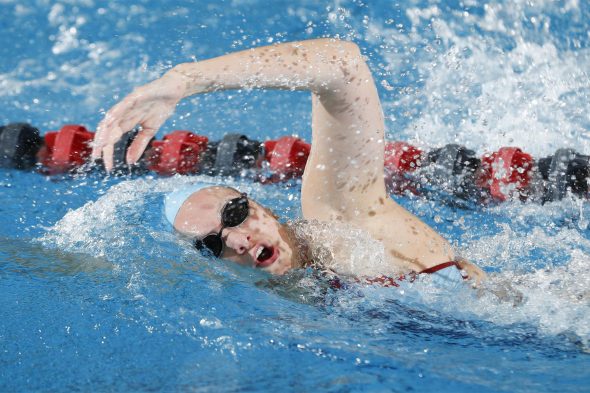Virtual ‘Mindful Mondays’ offer support to UIC student-athletes

When Michael Lipitz was named the director of Intercollegiate Athletics at the University of Illinois Chicago near the end of the 2019 fall semester, he was determined to take a holistic approach to support student-athletes.
Then came the COVID-19 pandemic, which required all collegiate sports seasons to be put on hold.
Lipitz, a former student-athlete himself who had spent many years helping helm other athletic departments at large institutions, realized the situation had left many student-athletes needing additional mental health support.
Among his priorities was to create and staff the position of director of student development, and after a nationwide search, Tasha Buchmiller was hired in May of 2020. His mission to her was clear.
“His biggest push as a former athlete was to really support our athletes holistically,” Buchmiller said.
After meeting with his team, including Buchmiller, Lipitz’s emphasis was on offering mental health assistance as the pandemic continued upending the world, including the sports seasons for most of the student-athletes. They discovered that while mental health was important for competition, the pandemic showed it was important for everyone during these trying times, she said.
As UIC athletics began planning for the 2020-21 school year, they contracted with Millennium Counseling, a Chicago-based counseling group, to provide virtual educational workshops to teams as well as to provide one-on-one sessions with individuals who may be in need of those resources. Some of the agency’s therapists are former student-athletes themselves who could meet the unique needs of the Flames’ 300 student-athletes involved in 18 teams on campus.

Student-athletes take part in a program called “Mindful Mondays” that provides them an hour every week to gather virtually to discuss issues that may be on their minds. A counselor leads the sessions as well as members of the Student-Athlete Advisory Committee, or SAAC. The virtual meetings cover mental health topics ranging from self-care to how to resolve a conflict with a teammate.
Among the issues facing student-athletes this year is how to navigate the pandemic.
Last fall, public health conditions resulted in all sports competitions being postponed until the winter and spring. Practice and training sessions started and stopped under the guidelines of public health officials and the department’s own COVID operating protocols. At the same, the majority of the classes remained virtual and students had to be resilient. Currently, all of the sports teams are in season and competing or have recently completed a full season.
For many student-athletes, not being able to practice or compete meant redefining who they were because for many, their identity aligned with being a student-athlete.
According to Sarah Meister, a psychotherapist at Millennium Counseling who works with UIC athletes, mental health is especially important because of the rigorous demands of being both a student and an athlete. Paying attention to their own mental health is important as they navigate the internal and external pressures that come with trying to be a successful college student and athlete at the Division 1 Level, said Meister, who also is a former Division 1 athlete.
“Sports often becomes an extension of their identity at this level, and it’s important to learn how to separate the athlete from the person, especially when the demands of the sport itself become tasking on both the mind and body,” Meister said.
Meister has seen how the pandemic has taken its toll on the overall athletic community as safeguards have been mandated for safety’s sake. But between having to take multiple COVID-19 tests weekly, adhering to social distancing restrictions that have taken away fans, and watching seasons cut short or competitions delayed, she has seen motivation and morale drop among athletic communities.
And when athletes test positive, correctly, there are strict protocols that must be adhered to before they are allowed to return to the practices and competitions. The social isolation that is required also weighs on their mental health, she added.
She credits UIC athletics for being at the forefront of prioritizing the mental health of student-athletes and destigmatizing mental health in collegiate athletics.
“So many athletes have been taught to push past the pain,” Meister said. “The mind and body connection is extremely strong and we’re teaching them how to cope with intense stressors, during a very fragile time in our world.”
Beth Kelzer, a swimmer who is a junior pursuing her degree in neuroscience, said the weekly virtual Mindful Monday meetings allow her to unwind after a long day and help her examine how she is feeling. The counselor provides a welcoming and comfortable space where she and the other student-athletes can discuss “everything that life throws at us,” said Kelzer.
In addition to her own mindfulness, Kelzer said that that the sessions help her connect and get to know the other student-athletes.
“It is life-changing to know I am not the only athlete or student here at UIC who is going through challenging days, weeks, or even months while in college,” Kelzer said.
And the virtual sessions also help her and other student-athletes cope with life in the era of COVID-19, when protocols are constantly changing, not only as athletes but in life. The pandemic has changed many of the routines student-athletes have used throughout their entire athletic careers. Training schedules may have had to be drastically altered or they’ve been unable to train as often as they need or want to and then the competitions themselves may have been altered or done away with completely, Kelzer said.
“All of those factors add additional pressure to athletes to perform their best at every opportunity they are given,” she said. “This pressure and stress are heavy and Millennium Counseling does a wonderful job at sifting through how we can take care of ourselves and love our sport — even with change.”
Categories
Campus, Faculty, Flames Athletics, Students, University
Topics
elearning, Flames, Flames Athletics, Michael Lipitz, online learning, Tasha Buchmiller
